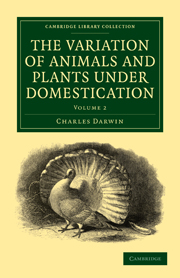Book contents
- Frontmatter
- Contents
- CHAPTER XII INHERITANCE
- CHAPTER XIII INHERITANCE continued – REVERSION OR ATAVISM
- CHAPTER XIV INHERITANCE continued – FIXEDNESS OF CHARACTER – PREPOTENCY – SEXUAL LIMITATION – CORRESPONDENCE OF AGE
- CHAPTER XV ON CROSSING
- CHAPTER XVI CAUSES WHICH INTERFERE WITH THE FREE CROSSING OF VARIETIES – INFLUENCE OF DOMESTICATION ON FERTILITY
- CHAPTER XVII ON THE GOOD EFFECTS OF CROSSING, AND ON THE EVIL EFFECTS OF CLOSE INTERBREEDING
- CHAPTER XVIII ON THE ADVANTAGES AND DISADVANTAGES OF CHANGED CONDITIONS OF LIFE: STERILITY FROM VARIOUS CAUSES
- CHAPTER XIX SUMMARY OF THE FOUR LAST CHAPTERS, WITH REMARKS ON HYBRIDISM
- CHAPTER XX SELECTION BY MAN
- CHAPTER XXI SELECTION–continued
- CHAPTER XXII CAUSES OF VARIABILITY
- CHAPTER XXIII DIRECT AND DEFINITE ACTION OF THE EXTERNAL CONDITIONS OF LIFE
- CHAPTER XXIV LAWS OF VARIATION – USE AND DISUSE, ETC
- CHAPTER XXV LAWS OF VARIATION, continued – CORRELATED VARIABILITY
- CHAPTER XXVI LAWS OF VARIATION, continued – SUMMARY
- CHAPTER XXVII PROVISIONAL HYPOTHESIS OF PANGENESIS
- CHAPTER XXVIII CONCLUDING REMARKS
- INDEX
CHAPTER XVII - ON THE GOOD EFFECTS OF CROSSING, AND ON THE EVIL EFFECTS OF CLOSE INTERBREEDING
Published online by Cambridge University Press: 05 July 2011
- Frontmatter
- Contents
- CHAPTER XII INHERITANCE
- CHAPTER XIII INHERITANCE continued – REVERSION OR ATAVISM
- CHAPTER XIV INHERITANCE continued – FIXEDNESS OF CHARACTER – PREPOTENCY – SEXUAL LIMITATION – CORRESPONDENCE OF AGE
- CHAPTER XV ON CROSSING
- CHAPTER XVI CAUSES WHICH INTERFERE WITH THE FREE CROSSING OF VARIETIES – INFLUENCE OF DOMESTICATION ON FERTILITY
- CHAPTER XVII ON THE GOOD EFFECTS OF CROSSING, AND ON THE EVIL EFFECTS OF CLOSE INTERBREEDING
- CHAPTER XVIII ON THE ADVANTAGES AND DISADVANTAGES OF CHANGED CONDITIONS OF LIFE: STERILITY FROM VARIOUS CAUSES
- CHAPTER XIX SUMMARY OF THE FOUR LAST CHAPTERS, WITH REMARKS ON HYBRIDISM
- CHAPTER XX SELECTION BY MAN
- CHAPTER XXI SELECTION–continued
- CHAPTER XXII CAUSES OF VARIABILITY
- CHAPTER XXIII DIRECT AND DEFINITE ACTION OF THE EXTERNAL CONDITIONS OF LIFE
- CHAPTER XXIV LAWS OF VARIATION – USE AND DISUSE, ETC
- CHAPTER XXV LAWS OF VARIATION, continued – CORRELATED VARIABILITY
- CHAPTER XXVI LAWS OF VARIATION, continued – SUMMARY
- CHAPTER XXVII PROVISIONAL HYPOTHESIS OF PANGENESIS
- CHAPTER XXVIII CONCLUDING REMARKS
- INDEX
Summary
The gain in constitutional vigour, derived from an occasional cross between individuals of the same variety, but belonging to distinct families, or between distinct varieties, has not been so largely or so frequently discussed, as have the evil effects of too close interbreeding. But the former point is the more important of the two, inasmuch as the evidence is more decisive. The evil results from close interbreeding are difficult to detect, for they accumulate slowly, and differ much in degree with different species; whilst the good effects which almost invariably follow a cross are from the first manifest. It should, however, be clearly understood that the advantage of close interbreeding, as far as the retention of character is concerned, is indisputable, and often outweighs the evil of a slight loss of constitutional vigour. In relation to the subject of domestication, the whole question is of some importance, as too close interbreeding interferes with the improvement of old races, and especially with the formation of new ones. It is important as indirectly bearing on Hybridism; and perhaps on the extinction of species, when any form has become so rare that only a few individuals remain within a confined area. It bears in an important manner on the influence of free intercrossing, in obliterating individual differences, and thus giving uniformity of character to the individuals of the same race or species; for if additional vigour and fertility be thus gained, the crossed offspring will multiply and prevail, and the ultimate result will be far greater than otherwise would have occurred.
- Type
- Chapter
- Information
- The Variation of Animals and Plants under Domestication , pp. 114 - 144Publisher: Cambridge University PressPrint publication year: 2010First published in: 1868



